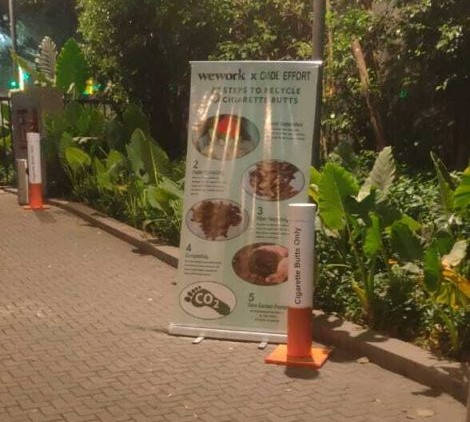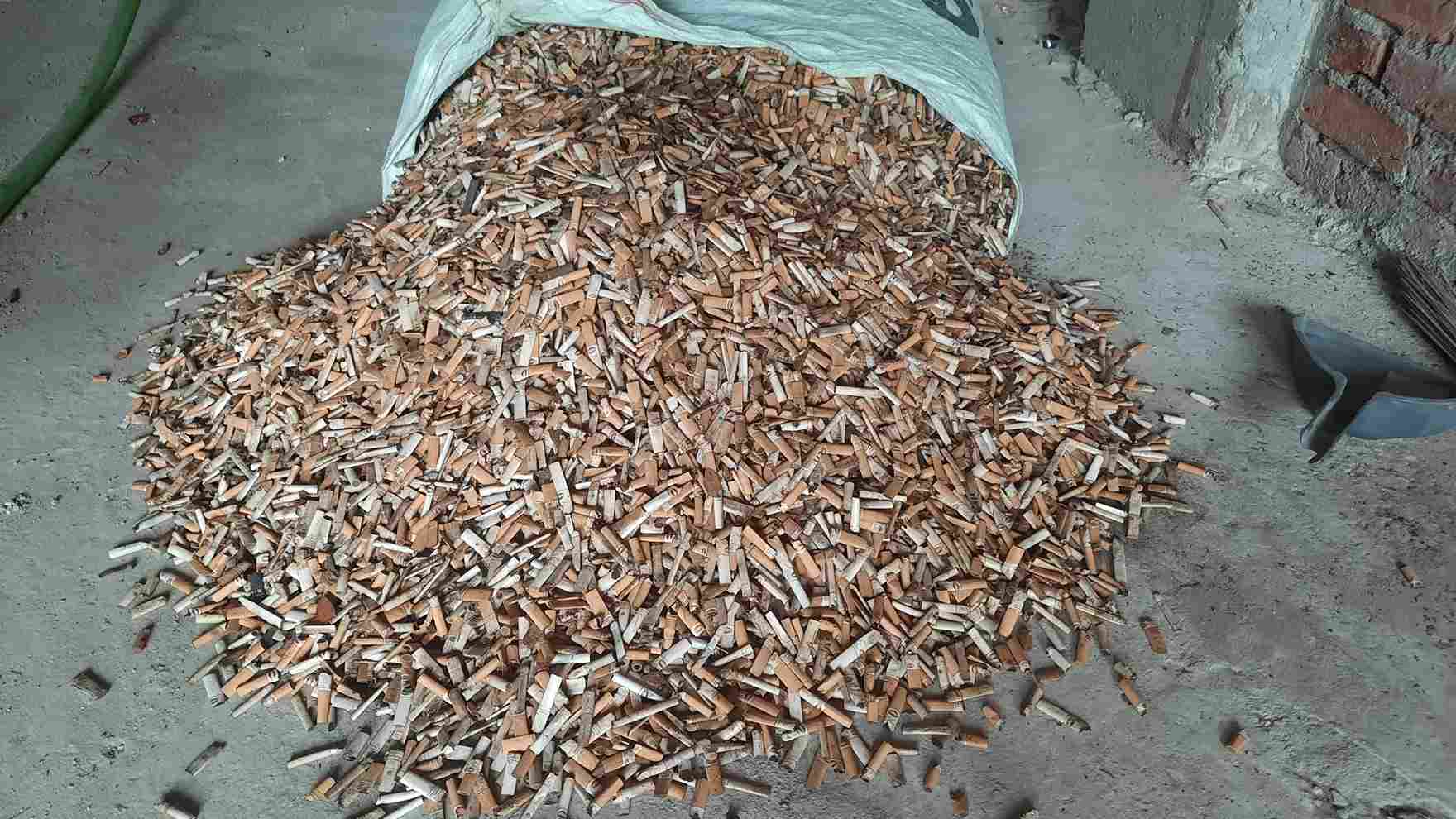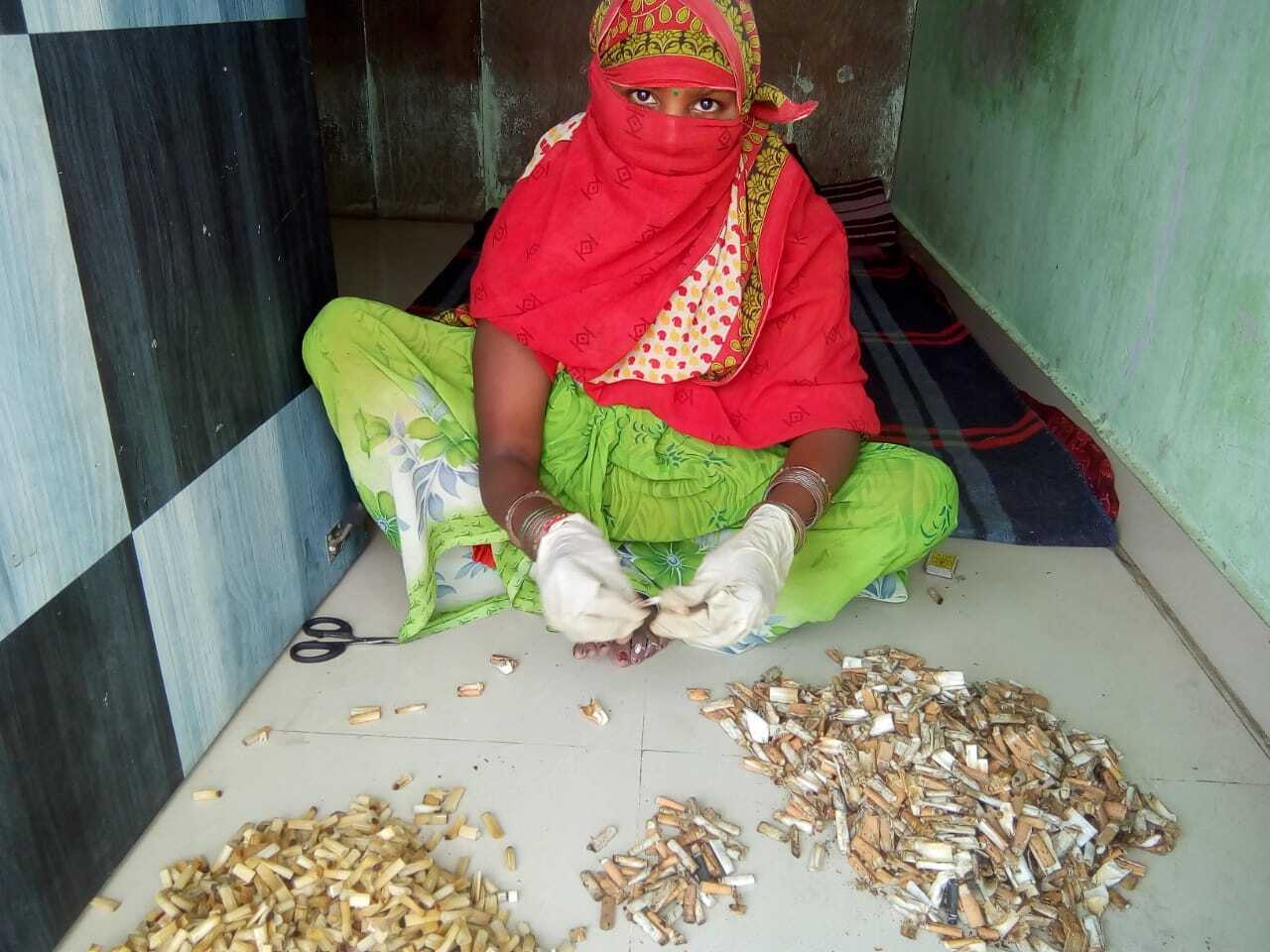Cigarette stubs are the most prevalent form of plastic waste on the planet, with a staggering 4.5 trillion discarded stubs polluting our environment. In the bustling streets of Noida, two brothers, Naman Gupta and Vipul Gupta, set out to tackle this pressing environmental issue and find a sustainable solution.
Naman was in his third year of BCom when he first noticed the ever-growing piles of discarded cigarette butts strewn across streets, parks, and public spaces around him. “Wherever we went, the issue of cigarette butts was impossible to ignore. It wasn’t just a local problem in Delhi-NCR, but one that spanned the entire country,” he recalls.
“There were no adequate disposal systems in place and no regulations for recycling this waste. I realised this was a problem that needed a solution,” he adds.
In 2018, Naman and his brother, Vipul, co-founded Code Effort Private Limited. Together, they set out to create a new form of recycling technology that could transform cigarette stubs into reusable and environmentally friendly materials.
“Code Effort is the brainchild of my brother,” Vipul shares. “When he first shared his vision to combat the growing environmental crisis by recycling cigarette butts, I immediately believed in his mission. His determination to make a positive impact on our planet resonated with me, and I joined him.”
Tackling waste from the source
Their first step was addressing the lack of infrastructure for collecting cigarette waste. After extensive research, the brothers came up with the idea of ‘V bins’. As Naman explains, “We realised that without the proper infrastructure to collect cigarette butts, recycling would be nearly impossible. So, we installed V bins in places like cigarette shops, offices, and commercial spaces, particularly in designated smoking areas, to make sure the waste was collected at the source.”

“Unlike traditional waste bins, our V bins are specifically designed to collect only cigarette butts. This ensures that the waste remains separate from other trash, preventing it from ending up in landfills or contributing to environmental pollution,” he explains. “Additionally, they are both waterproof and fireproof, making them safe for public spaces.” In six years, the startup has successfully installed over 2,00,000 V bins across the country.
With the V bins in place, Code Effort began its recycling journey. “The collected cigarette butts are transported to our facility in Noida, Sector 134, where they undergo a meticulous process to separate their components. The waste is broken down into three key parts, the fibre (cotton-like material), the paper wrapping, and the tobacco and ash remnants,” Naman explains.

“We knew from the start that we needed to develop a process that was both efficient and safe for the environment,” he says. “We focused on using biodegradable chemicals that could break down the waste safely.”
The cigarette stubs are first cut into smaller pieces, and the fibre, paper, and tobacco are separated. The fibre is treated with biodegradable chemicals, dried, and processed into a soft material ready to be used in various products like plush toys and cushion covers.
From waste to wonder
Initially, Code Effort began with manufacturing three main products, plush toys, gift items, and cushions. The plush toys quickly became the identity of the company. Made from the recycled fibre of cigarette butts, these toys are not only eco-friendly but also safe for children. “The moment we got the results from government-certified labs confirming that the recycled materials were safe, we knew we could push forward with our vision,” Naman recalls.
“We needed to build custom machines that could handle the unique challenge of cigarette butt recycling. So, we connected with fabricators who had the expertise to design machines based on our specifications,” he says.
The process began with the development of a cutting machine, which was designed to shred the cigarette stub fibres into small pieces. “This cutting process takes less than 30 seconds for each batch,” he explains.
“Once the fibres are cut and formed into a pulp, we use biodegradable chemicals to treat them and this process takes around 24 hours,” he elaborates.

Following the treatment, the fibres are washed and dried using specialised machines. “The final step involves the fibres being processed through a carding machine, which softens them further to make them suitable for use in plush toys, cushions, and other products. This step ensures that the fibres are smooth and soft,” explains the co-founder.
The machines used for these processes are all fabricated in India and tailored to the specific needs of cigarette stub recycling. “We worked closely with the fabricators, providing them with detailed specifications on how the machines should operate,” Vipul shares.
The brothers used a natural, biodegradable method of composting to handle the leftover tobacco and ash from the cigarette butts. “We use bacteria and fungus, sourced from fertiliser companies, to convert the tobacco into compost powder and supply to the nearby nurseries,” Naman explains.
Generating employment for rural women
“To create our end products like plush toys and cushions, we source threads and outer fabrics from local suppliers in the Delhi-NCR region,” says Naman. “These materials are then stitched by over 100 rural women artisans from Nangli village, Noida. We provide them with the necessary training, equipment, and machinery to make high-quality products.”
“By involving these artisans in the production process, we not only recycle waste but also create a sustainable livelihood for them,” explains Vipul.
Poonam Chauhan, a 35-year-old homemaker, shares, “I have been stitching and creating handicrafts for over 10 years, but my work was always confined to my home because, in our culture, women weren’t allowed to work outside. I bought a small sewing machine and learnt sewing through tutorial videos. Everything changed when Code Effort started operations in Nangli village (Sector-134, Noida) in 2019.”

“They approached me with an opportunity to work with them, making keychains, toys, and cushions. They provided the materials and trained me to meet the quality standards and exact sizes needed for their products. From earning just Rs 20 per day, my income has increased to Rs 1,000 per day. The business has given me financial independence, respect, and recognition,” she adds.
Rajni, a 23-year-old artisan, shares, “I have been working with Code Effort for the past three months, and during this time, I’ve learnt to create a variety of products like teddy bears and dolls. The income I earn has been a great support to my family.”
Diversifying products
“We also work with existing mills to recycle paper from cigarette butts and supply our fibres to textile mills, where they are turned into yarns used for garments. Our business aims to recycle waste to create useful products and provide jobs,” Naman shares.
Code Effort can recycle up to three tonnes of cigarette stub fibres every day. “We recycle in small batches, with each cycle using around 5 kg of fibre,” he adds.

“Our startup holds certifications including ISO 9001, ISO 14001, ISO 45001, GRS, BIS, and FSC, underscoring our dedication to maintaining the highest levels of safety. It’s essential that our products are not only environmentally friendly but also safe for our consumers,” shares Vipul.
The company’s products are used by renowned brands such as MG Motors, Reliance Retail, and Nesta Toys. “We primarily operate as a B2B company and rarely serve individual customers directly. Our focus is on white labelling products for various retail brands. There are two main advantages to this approach, firstly, the orders are typically much larger in volume. Secondly, once the design, size, and specifications are agreed upon, they remain consistent throughout the production run,” Naman explains.
Collaborating with ragpickers
Code Effort also places a strong emphasis on social impact. While introducing V bins has been crucial in streamlining the collection process of cigarette subs, the company also works closely with ragpickers.
“We offer them a source of livelihood by paying them to collect cigarette butts. This network of over 2,500 ragpickers across 250 districts in India has been instrumental in scaling our operations,” says Naman.

“One of the biggest challenges we faced early on was raising awareness about cigarette butt recycling,” explains Naman. “Cigarettes are a sensitive topic, and encouraging people to talk about the issue of cigarette waste openly proved difficult. However, once people understood the significant environmental damage caused by them, their support for our initiative grew considerably.”
Another challenge was convincing consumers that sustainable products could be affordable. “There’s a misconception that eco-friendly products are always more expensive,” he adds. “We have worked hard to keep our products competitively priced while maintaining high standards of quality. It’s important to us that sustainability is accessible to everyone.”
Building a sustainable future
Over the past six years, the company claims to have successfully recycled more than 10 billion cigarette butts, preventing the contamination of 250 billion litres of water. Additionally, offsetting 400 billion grams of carbon emissions, it has made a substantial impact in the battle against climate change.
Looking ahead, the Gupta brothers aim to expand their product portfolio with innovations like air purifiers and pet products, which are currently in the research and development phase. “We are always looking for new ways to use our recycling process to create meaningful products,” says Vipul.

The company is also exploring international markets through joint ventures with companies abroad. “Our long-term goal is to make Code Effort the go-to company for solving the cigarette butt waste problem globally,” he adds. “We want to share our model with the world and inspire others to think differently about waste management.”
“Our name, Code Effort, embodies the power of collective action. It reflects our commitment to bringing people and ideas together to manage waste and build a more sustainable future. By providing employment opportunities to ragpickers and artisans, we aim to transform waste into value while raising awareness and instilling a sense of environmental responsibility,” concludes Naman.
Edited by Arunava Banerjee; All pictures courtesy Naman Gupta
No comments:
Post a Comment